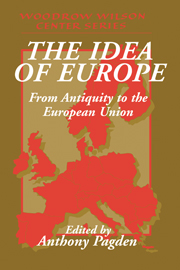Book contents
- Frontmatter
- Contents
- Acknowledgments
- Introduction
- 1 Europe: Conceptualizing a Continent
- 2 Some Europes in Their History
- 3 “Europe” in the Middle Ages
- 4 The Republican Mirror: The Dutch Idea of Europe
- 5 The Napoleonic Empire and the Europe of Nations
- 6 Homo Politicus and Homo Oeconomicus: The European Citizen According to Max Weber
- 7 The European Self: Rethinking an Attitude
- 8 European Nationalism and European Union
- 9 From the Ironies of Identity to the Identities of Irony
- 10 Muslims and European Identity: Can Europe Represent Islam?
- 11 The Long Road to Unity: The Contribution of Law to the Process of European Integration since 1945
- 12 The Euro, Economic Federalism, and the Question of National Sovereignty
- 13 Identity Politics and European Integration: The Case of Germany
- 14 Nationalisms in Spain: The Organization of Convivencia
- 15 The Kantian Idea of Europe: Critical and Cosmopolitan Perspectives
- Contributors
- Index
- Cambridge Cultural Social Studies
12 - The Euro, Economic Federalism, and the Question of National Sovereignty
Published online by Cambridge University Press: 14 July 2009
- Frontmatter
- Contents
- Acknowledgments
- Introduction
- 1 Europe: Conceptualizing a Continent
- 2 Some Europes in Their History
- 3 “Europe” in the Middle Ages
- 4 The Republican Mirror: The Dutch Idea of Europe
- 5 The Napoleonic Empire and the Europe of Nations
- 6 Homo Politicus and Homo Oeconomicus: The European Citizen According to Max Weber
- 7 The European Self: Rethinking an Attitude
- 8 European Nationalism and European Union
- 9 From the Ironies of Identity to the Identities of Irony
- 10 Muslims and European Identity: Can Europe Represent Islam?
- 11 The Long Road to Unity: The Contribution of Law to the Process of European Integration since 1945
- 12 The Euro, Economic Federalism, and the Question of National Sovereignty
- 13 Identity Politics and European Integration: The Case of Germany
- 14 Nationalisms in Spain: The Organization of Convivencia
- 15 The Kantian Idea of Europe: Critical and Cosmopolitan Perspectives
- Contributors
- Index
- Cambridge Cultural Social Studies
Summary
For years the construction of Europe has been discussed and made by experts. Because the wider public never quite knew what was going on or what the issues at stake quite were, “Europe”—at least in most European nations—enjoyed a generally positive, if also somewhat vague, reputation. Criticism became apparent only when referenda on the various stages of the development of European unification transformed it into a public affair. It was as if a long-agreed discourse on the need for a unified Europe had effectively camouflaged the consideration of all opposing interests, as if the only acceptable Europe was one that would be realized by those who alone were competent to handle such matters, and behind closed doors.
Central to all potential objections to European integration has been and remains the question of sovereignty. And it is sovereignty that has been at the core of the debate on monetary union, since the issues at stake involve such time-hallowed functions of national states as the right to mint money, the independence of central banks and their possible subordination to an exterior central power, the loss of parliamentary prerogatives, and even the loss of a fundamental element of national identity: the national currency itself.
The first difficulty that arises from any attempt to understand the relationship between monetary union and sovereignty stems from the multiple meanings that are accorded to the latter. For the term no longer implies simply the complete and absolute authority of the sovereign body.
- Type
- Chapter
- Information
- The Idea of EuropeFrom Antiquity to the European Union, pp. 260 - 286Publisher: Cambridge University PressPrint publication year: 2002
- 2
- Cited by

